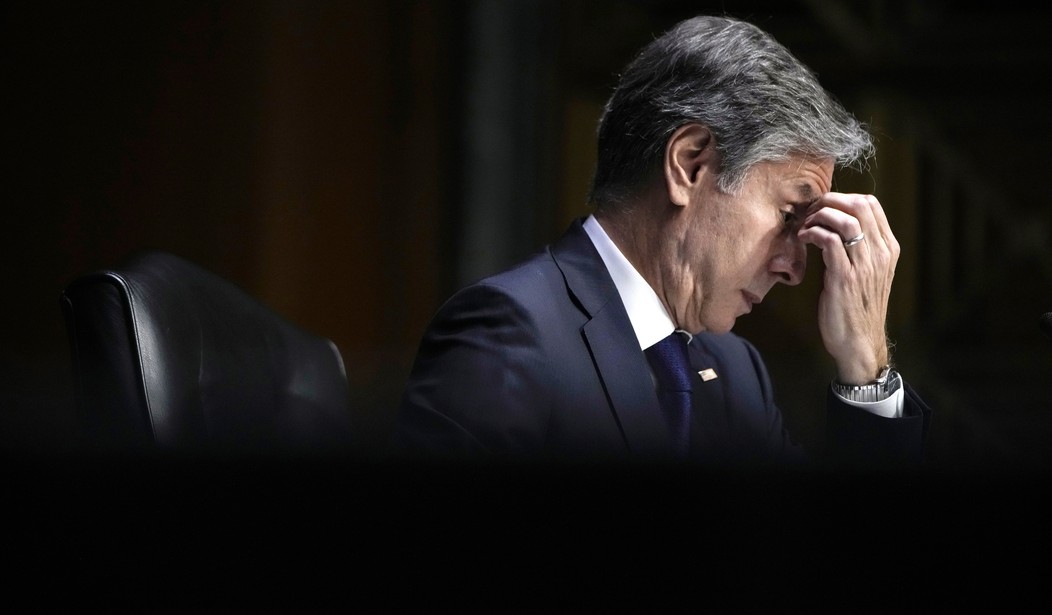Jazz commented to me behind the scenes that this sounds like a story from the Onion. Unfortunately, Secretary of State Antony Blinken really made this argument yesterday in his Senate testimony. “What is the state of play for women in Afghanistan right now?” asked Sen. Lindsey Graham after Blinken insisted that he didn’t regret the pullout of American forces from the country. “What’s the upside?”
The answer would have gotten fact-checked into oblivion had the Babylon Bee offered it as a satire:
Secretary of State Antony Blinken says there is “greater stability and peace” for women in the Taliban-led Afghanistan pic.twitter.com/61FOp7kYxZ
— RNC Research (@RNCResearch) April 27, 2022
BLINKEN: The state of play is, ah, extremely mixed, to the negative for women [crosstalk].
GRAHAM: What’s the upside for women?
BLINKEN: The only upside that we’ve seen at all is that, somewhat ironically you might say, there is in the country at large greater stability and relative peace than there’s been.
Seventh-century theocratic oppression does grant a certain level of “stability,” at least in theory, but this situation isn’t theoretical. Neither is the reality of that oppression for women and girls under Taliban rule, as ANI reminded people last week:
Ever since the Taliban took control of Kabul in mid-August last year, the right to education, especially for girls, has been a major concern as the Islamic outfit has time and again flouted the basic human rights in Afghanistan.
The Taliban have issued a decree banning female students above grade six from attending their classes in schools. The girls were further told to stay home until the Islamic Emirate announces its next decision. …
Taliban`s U-turn on girls` education is most disconcerting. The decision, sudden and unexpected even for the executing officials, suggests that it might have been the whims of hardliners that prevailed over any step that returns the country to normalcy, the report said. …
Since the Taliban took control, Afghan girls are facing restrictions on travel, work, and education, besides their deteriorating safety situation in the country.
So much for stability, eh? None of this is a surprise either, because this is precisely how the Taliban ruled Afghanistan before 9/11, and why they had fought a long civil war against the Northern Alliance before then. On that point too, the US exit didn’t end the war in Afghanistan, but just our involvement in it. The Taliban is still fighting against competing terrorist groups, including ISIS-K, which the US considers a threat to our own national security as well. The Washington Post reported last week that the war is actually escalating in Afghanistan:
A four-day blitz of terrorist bombings across Afghanistan has left the country reeling after months of relative calm, raising fears that the Taliban — which spent years fighting the Afghan state and its U.S. backers — will be unable to maintain the peace.
Sunni extremists from the Afghan branch of the Islamic State, known as Islamic State-Khorasan or ISIS-K, have claimed at least one of the attacks, a bombing Thursday inside a crowded Shiite mosque in the northern city of Mazar-e Sharif that killed at least 31 people and injured more than 60. On Friday, Taliban officials announced the arrest of a local Islamic State leader who they claimed was the “mastermind” of that attack.
But just hours later, another bomb exploded at a Sunni mosque in northern Kunduz province, killing more than 30 people, and a mine was detonated near a market in Kabul. The blasts capped a violent and chaotic week, which included a double bombing outside a school in the ethnic Shiite Hazara district of Kabul and another attack in Kunduz on government workers.
All told, at least 77 Afghans have been killed and more than 160 wounded. Graphic video from the mosque attack in Mazar-e Sharif showed numerous bodies covered in blood and broken glass, sprawled on the floor where hundreds of people had come to pray.
Does that sound like “peace” and “stability” to you? Not even ironically, somewhat or otherwise. Better question: why would it look like peace or stability to America’s top diplomat? The answer is that Blinken is desperate to deflect attention away from this administration’s catastrophic rout out of Kabul, not to mention the abandonment of 14,000 Americans to the Taliban.
How many are still left? And why isn’t the media asking that question of Blinken and State every single day?








Join the conversation as a VIP Member